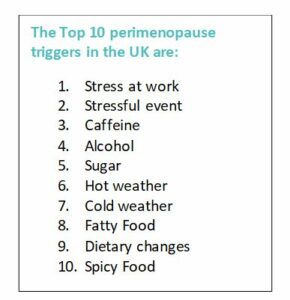Let’s Talk About Perimenopause

Stress at work, shorter daylight hours and even that cup of coffee can all lead to an increase in symptoms!
Perimenopause is a condition that affects, or will affect all women at some point in our lives – usually in our forties, fifties and beyond, and with the recent World Menopause Day, thankfully it’s becoming a topic that we can all discuss.
More and more people, including celebrities like Mariella Frostrup and Davina McCall, are talking about it, and yet there are still misunderstandings around the menopause and the perimenopausal years leading up to it when symptoms like hot flushes, insomnia, brain fog and mood changes begin to appear.
But actually, there is plenty we can do to help limit the frequency and severity of perimenopause symptoms by recognising the triggers and making adjustments to our mental attitude, lifestyle and diet choices.
 Perimenopause triggers
Perimenopause triggers
The UK’s No.1 perimenopause brand Health & Her conducted research with women going through perimenopause and found that 80% reported at least one trigger of perimenopause symptoms, with stress at work, caffeine and stressful events being the top three most common.
Other triggers are alcohol, sugar, hot weather, cold weather, fatty food, dietary changes and spicy food.
Dr Rebeccah Tomlinson, GP menopause specialist at Health & Her comments:
It’s not surprising to me that stress features twice in the top three and is a major cause of amplifying symptoms felt by women during this time.
“In small doses, stress is fine, but when it revs up especially during work, the body goes into fight or flight mode. Your brain signals the release of the stress hormones, cortisol and adrenaline, which prepares your body for action.
“The reason stress at work is cited so frequently by women is because oestrogen helps maintain cortisol levels, so when oestrogen levels start to drop things go out of balance. It then becomes a vicious circle. the more you stress the more you experience mind, mood and sleep problems.
“However, all the triggers in the top ten can be easily managed by tracking, so that you can understand how they connect to your symptoms.
“In doing this you can then start to make changes to your lifestyle, diet, and outlook accordingly.”
Top tips for keeping on top of triggers from Julie Dennis, Health & Hers menopause work coach
Manage stress
Eat your frogs early and the biggest one first. This is a metaphor for tackling the most challenging task of your day – the one you would typically put off. Deal with it early and relax into your day.
Avoid perfectionism. 80% is usually enough. So, relax your expectations and accept that striving for perfection isn’t a good use of your time, and is often not a realistic outcome.
Review your regular tasks. Free up time by ditching tasks that are no longer relevant. Is there a report you complete on a weekly or monthly basis that lacks value or would be better completed by a colleague?
When the going gets tough, the tough get going. Seriously, take a break – five minutes away from your desk can dramatically improve your concentration during the periods you work.
Everything in moderation
Look at your alcohol and caffeine intake, think about cutting down or stopping altogether – embrace sober October this year. Consider why you reach for that glass of wine or coffee and look to replace it with another positive activity or try alternatives that are caffeine or alcohol free.
Track & learn
Keep a note of what symptoms you are experiencing and when, see if there is a correlation with known triggers. You can then make changes to your lifestyle, diet, and outlook. The free Health & Her perimenopause and menopause app helps to do both, as well as set up a plan of helpful exercises to help manage stress and reminders to do things like drink more water.
Limit & switch
Watch your daily intake of sugary and fatty foods and try to cut down on these types of treats to once or twice a week. Switch to wholegrain carbohydrates, low fat and low sugar alternatives. Also, watch out for hidden sugars and fats in food and drinks such as processed foods and alcohol.
Show your gut some love
Increasing evidence points to the benefits of looking after your gut health with a regular intake of live cultures to build a strong microbiome. This aids digestion, supports healthy hormone production and raises serotonin levels, great for mind and mood. The Health & Her Biome range contains live cultures, vitamins & minerals to help women who are going through perimenopause and menopause who also want a phytoestrogen free supplement.
Positive steps
Ensure you get enough daylight by going for a 30-minute walk daily especially in the darker months. Eat a well-balanced diet and try exercising 3-4 times per week. Always take a vitamin D supplement and if your diet is not diverse, top up with a quality supplement like Health & Her Perimenopause Supplement which contains vitamins, minerals and active botanicals to help women who are going through perimenopause.




